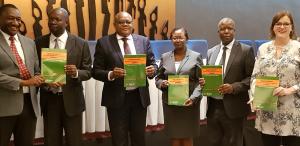Zambia on the road to improving health equity through action on Social Determinants of Health
The attainment of Zambia’s goal of being a prosperous and middle-income country by 2030 as stipulated in its Vision 2030 is dependent on among others, a healthy and productive population. Health has therefore been prioritized as a key economic investment in the Seventh National Development Plan 2017-2021. The Ministry of Health is implementing the National Health Strategic Plan to provide equitable access to cost effective, quality health services as close to the family as possible based on the principle of Universal Health Coverage using an integrated people-centered Primary Health Care approach. The country has made significant steps towards improving the health of the population, including the introduction of a national health insurance scheme. However, a report jointly published by the Ministry of Health and the World Health Organization on 27 November 2019 in Lusaka entitled “Health Equity and Social Determinants of Health in Zambia” shows that health inequalities continue to persist and many people don’t have the same opportunities to be as healthy as others.
The first ever of its kind in the country, the report presents results of a study which was undertaken to assess the level of inequalities and inequities related to health and Social Determinants of Health. The study demonstrates how a person’s opportunity for health is influenced using 8 key health domains and more than 40 core indicators along which health inequalities are commonly examined. It has demonstrated that health inequalities continue to persist and are evident between provinces, and also across subgroups of the population of different socioeconomic status, age, education level, employment, occupation, place of residence and sex which can all impact access to services and population health status.
The World Health Organization has emphasized that health inequalities that are avoidable and preventable constitute health inequities that can be reduced by a mix of government policies and recommends that inequality monitoring should be a central component of national health information systems. “This report is timely because it presents evidence which will support policy development to ultimately improve health status and work towards closing the equity gap. What is needed is effective communication of existing analyses and underlying disaggregated data to the appropriate target audiences, expanded and more rigorous analysis of existing data, improving the quality, scope and reach of data collection efforts” said Dr O-tipo Shikanga, in a statement he made on behalf of the WHO Representative.
The report is considered an important milestone which has set the country on a path to further strengthen interventions for improving health and equity. The Permanent Secretary at the Ministry of Health, Dr. Kennedy Malama stated that the government was committed to moving towards Universal Health Coverage to improve equity and the health of Zambians. He emphasized the importance of multi-sectoral approaches in addressing Social Determinants of Health using tools such as the Health in All Policies as most of the determinants of health were outside the control of the health sector. “Health is about collectiveness, you cannot make a difference working in isolation” he said.
Specific policy options and recommendations have been made for improving exclusive breastfeeding and childhood nutrition; increasing equity in antenatal care coverage and births attended by skilled health personnel; improving family planning, prevention of communicable and non-communicable diseases including increasing the availability of health personnel. The report has also identified key action areas for addressing social determinants of health. These include, amongst others: development of evidence based pro-poor policies, use of health in all policies approach, prevention of communicable and non- communicable diseases, strengthening the health system, education including early childhood development, gender empowerment, reproductive, maternal and child health, improving access to safely managed sources of drinking water and improved sanitation facilities, poverty alleviation and social protection, promoting healthy lifestyles, road safety and improving living conditions in informal urban settlements.
The WHO has emphasized that effective monitoring of health inequalities and inequities depends on strengthening national routine data collection systems to collect disaggregated information, allocating adequate resources, building capacities for measuring and monitoring inequalities and inequities, sustained political commitment and successful implementation of the Sustainable Development 2030 agenda.
The launch of the report brought together a wide range of representatives from government ministries and departments, Donor agencies, UN Agencies, Multilateral and Bilateral institutions, Partners in health development, Academic and research institutions, NGOs and the media in order to harness a multitude of stakeholders to effectively tackle the SDH and improve population health.






